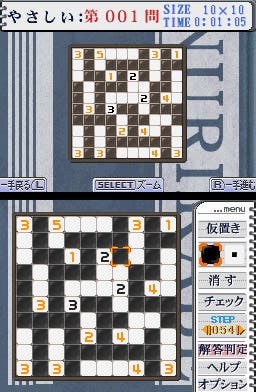Japanese DS Roundup
Taking a closer look at the games we never see here.
The Nintendo DS is a phenomenon almost beyond our understanding. Sales in the UK are stunning, with the device proving appeal across all of gaming's traditional boundaries. But it as nothing when compared to its success in Japan. It's frankly bewildering.
The DS has now outsold the PS2 in lifetime sales. In Japan alone, 20,954,157 units have been sold. Pluck a random week in January and you find 103,000 were sold compared to 34,000 PS3s or 5,500 Xbox 360s. That means one in every six people in Japan own a DS, with up to 300,000 more going out on a weekly basis.
And the software is as crazy. Nintendo dominates Japanese software charts in a way that's frankly embarrassing for everyone else. To take the same week, it saw the Wii and DS occupying 16 of the top 20 software sales, the DS claiming 9 of those spots. This was no anomaly. Week after week the top 10 is almost exclusively Nintendo. It's another world.
To meet this demand, Japan sees a lot more releases than either the US or UK. A lot more. Every now and then one of those will catch the population's attention. Ouenden, Slitherlink, etc. But too often they slip us by, forever forgotten to the West in a muddle of confused menus and bemusing kanji.
To combat this, we're going to filter through the more interesting Japanese releases, and let you know which might be worth importing, and which should avoid the, "Will customs catch my package?" gamble. Obviously this won't be comprehensive. A seeming majority of Japanese DS releases are educational games to teach either English or Japanese, or are just so terrifyingly coloured that honestly, we're frightened to try and fathom them. These will be reviews for people like me, who don't speak a lick of Japanese, who can't tell a "continue" from a "delete save file". If there are any we miss, or any classics you think should be brought to the wider world's attention, let us know in the comments and we'll take a look. This time, to kick things off, here are a couple of new puzzle games, and one stunning classic from last year.
Puzzle Series Vol. 11: Nurikabe
- Husdon
- 3,240 Yen / GBP 15.20
The Hudson Soft Puzzle Series has quietly become the definitive collection of DS puzzles, nay, any puzzles, and not one European or US publisher has had the ounce of sense it would take to release them. For goodness sakes, you just need to write some shite on the box like, "Mind Training: Puzzles For Brains and Ladies" and they'd sell ten billion copies each. From Sudoku to jigsaw puzzles, Puzzle Series has included all the popular challenges that occupy about 90 percent of the average newspaper, as well as some slightly more unknown Japanese favourites. Nurikabe has been noticed by a significant proportion of Eurogamer's readership, and it's about time it got a mention, despite being a year old.

Explaining a puzzle game someone's not heard of before is a lot like trying to describe a fever dream using only sign language. You have a grid of squares, in it are some numbers, your task is to work out which squares should be black and which should be white. Like planning an American city, then. The number tells you how many connected (by side, not diagonal) white squares must accompany it. As with so many of these puzzles, Nurikabe takes a simple premise, and then requires you to teach yourself a series of rules and tricks that allow you to succeed. Figuring these out and applying them makes you feel like a champion, earning every success.
As is typical for the latter half of Puzzle Series, this Nurikabe incarnation is flawlessly implemented, with an uncluttered interface, intuitive stylus or button controls, and no pointless frills or animations that interrupt your play. It's peculiar how hard it must be to get this right, but it really seems that Hudson are the only DS developers who can do it.
Even more important is the learning curve. Each puzzle is so carefully designed and positioned, deliberately teaching you new techniques by introducing a stumbling block along the path of what you can already do. It plays with you, letting you get comfortable with a particular technique (putting a black square between any adjacent-but-one numbered squares) to get going, and then shows you another stage of play, then removes the adjacent thing leaving you feeling frightened, but equipped. Of all the games in the series, I think Nurikabe took the longest to click in my head (an hour), and then as with Slitherlink, Picross, etc, it was love. Deep, stupid love.
9/10

